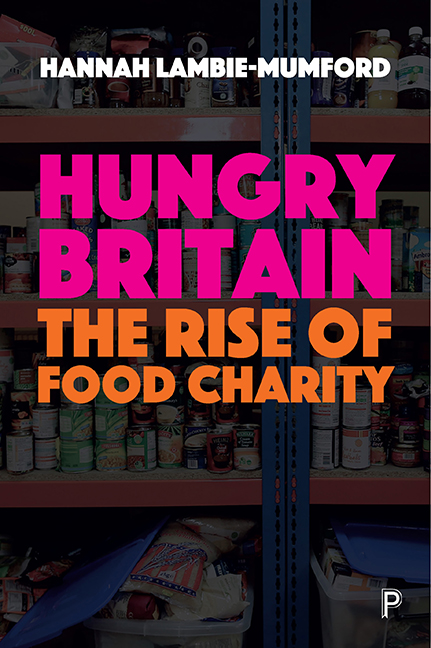Book contents
- Frontmatter
- Dedication
- Contents
- List of figures
- List of abbreviations
- Acknowledgements
- Foreword
- One Introduction
- Two Hunger and charitable emergency food provision in the UK and beyond
- Three Theories of the food insecurity ‘problem’ and the right to food ‘solution’
- Four Food charity: the ‘other’ food system
- Five The sustainability of food charity
- Six Food charity as caring
- Seven Food charity and the changing welfare state
- Eight Conclusion
- References
- Index
Three - Theories of the food insecurity ‘problem’ and the right to food ‘solution’
Published online by Cambridge University Press: 05 April 2022
- Frontmatter
- Dedication
- Contents
- List of figures
- List of abbreviations
- Acknowledgements
- Foreword
- One Introduction
- Two Hunger and charitable emergency food provision in the UK and beyond
- Three Theories of the food insecurity ‘problem’ and the right to food ‘solution’
- Four Food charity: the ‘other’ food system
- Five The sustainability of food charity
- Six Food charity as caring
- Seven Food charity and the changing welfare state
- Eight Conclusion
- References
- Index
Summary
This chapter sets out theoretical approaches to both food security and the human right to food. Food insecurity is employed here as a specific way of interpreting the ‘problem’ that leads people to seek assistance from emergency food providers, and the right to food as a way of envisaging not just the ‘solution’ to these experiences but a more comprehensive approach to the realisation of socially just food experiences for all. So, while the notion of ‘food security’ is a prerequisite for the realisation of the right to food, the progressive realisation of this right actually incorporates much more, as will be discussed.
Terminology surrounding food poverty, food insecurity and hunger are not necessarily clearly defined, widely used or understood in the UK. As such, this chapter begins by setting out a clear conceptualisation and definition of the problem of food insecurity. This is informed not only by previous work on food poverty and food insecurity but also by theoretical work on poverty itself, particularly that of Lister (2004). The right to food, its historical context and the UK's relationship to it are also set out.
Two particular aspects of the right to food are focused on: issues of adequacy, acceptability and sustainability; and the state's obligation to respect, protect and fulfil the right. These two elements are explored through utilising several concepts and theories for framing the analysis of empirical data: othering; agency; care; and social protection. By employing these concepts the book engages food insecurity and the right to food with literatures on exclusion, power, care ethics and welfare states.
A theory of food insecurity
The variety of language used to describe the experience of lack of access to food is a significant challenge to UK research in this field. ‘Hunger’, ‘food poverty’ and ‘food insecurity’ are all utilised, and food poverty and insecurity have come to be used interchangeably in the UK (see Dowler and O’Connor, 2012). The idea of food poverty has particular resonance when applied to household-level experiences (BBC, 2014; Cooper and Dumpleton, 2013; Dowler et al., 2001; Hitchman et al., 2002; Lang et al., 2010; Oxfam, 2013). ‘Food security’, on the other hand, has often (but not always) been used to refer to national food supply issues and global or national food systems rather than lived household experiences, particularly by the UK government (Kneafsey et al., 2013).
- Type
- Chapter
- Information
- Hungry BritainThe Rise of Food Charity, pp. 33 - 56Publisher: Bristol University PressPrint publication year: 2017

